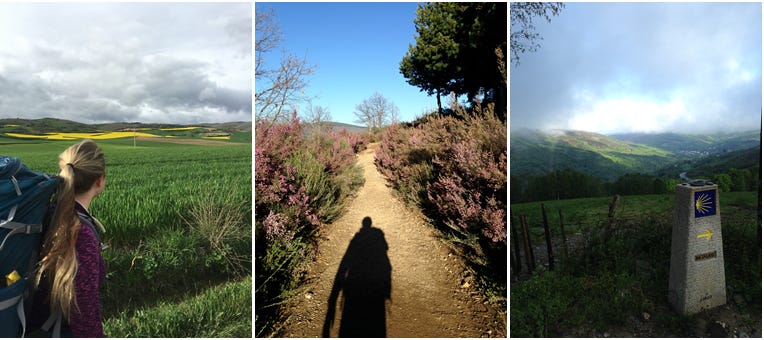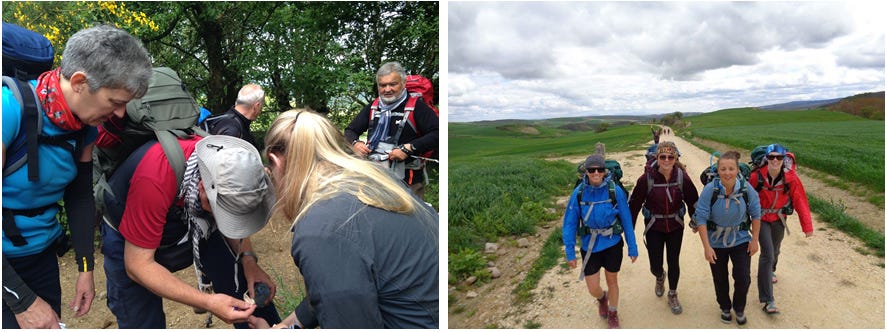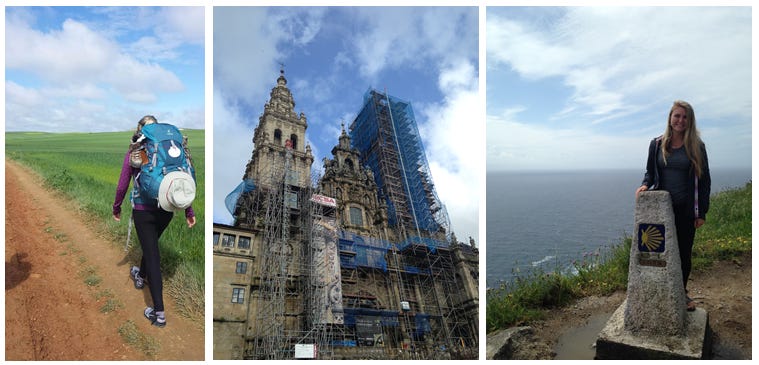The PhD Pilgrimage
How my experience as PhD student mirrors my experience on the Camino de Santiago.
In May of 2016, I stood on the border of France and Spain and began to walk; and I continued to walk for a few hundred miles. The Camino de Santiago (the Way of St. James) is a pilgrimage (a traditionally spiritual journey or rite of passage) that runs across Spain and ends at the cathedral of Santiago de Compostela.
In August of 2019, I sat down at the University of Utah and began to do research, and I continued to research for a few… well, I am still doing research. A PhD ( Doctor of Philosophy) is a course of study and scientific research resulting in the highest academic achievement awarded.
The Camino is a Pilgrimage
The Camino is essentially just a walk. Walkers or pilgrims are defined by:
a backpack to carry their stuff
a “Credencial del Pelegrino” (pilgrim passport) which gets stamped at each town you stay in
a concha (scallop shell) which is a symbol of the pilgrimage, the origins of which are ancient and no longer clear
staying in Albergues (rudimentary hostels) with other pilgrims along the way
saying “Buen camino” (have a good walk) to other pilgrims
I did the Camino as an undergrad with a class as a May study abroad experience. The Camino can vary in route and length, but the traditional route is around 500 miles, and the shortest version is just 100km. We did around 300 miles.
A PhD is also a Pilgrimage
After some reflection, I have drawn so many connections between my experience as a pilgrim and my experience as a PhD student; I couldn’t not write about it. Both aspirations have a clear end goal, but the purpose of both is the journey, not that end goal. They are both frequently miserable and make you question why you chose to pursue them, but they can be ultimately fulfilling. And in both cases, your direction is much more important than your speed. I could go on and on, so I have divided my thoughts and connections into some major themes.
Liminoid Phenomenons
Liminality is a state of existence experienced when one steps outside of their role or position in society during a transition or a right of passage. A sense of ambiguity and disorientation occurs when one is removed from social constructs and forms of structure and rank. Victor Turner describes rites of passage as having three phases in his book “Image and Pilgrimage in Christian Culture: Anthropological Perspectives”:
“The first phase comprises symbolic behavior signifying the detachment of the individual or group from a fixed point in the social structure.” (Starting a pilgrimage or PhD)
“During the liminal phase, the state of the ritual subject becomes ambiguous. You pass through a realm or dimension that has few or none of the attributes of the past.” (Walking or researching)
“In the third phase, the passage is consummated, and the subject returns to classified secular or mundane social life.” (Finishing and moving on)
It is arguably much easier to classify the Camino as a liminal state - removing all societal pressure and adopting the sole purpose of walking is a clear example of a temporary dissolving of structure. But Turner also describes a liminoid phase as:
“movement from a mundane center to a sacred periphery which suddenly, transiently, becomes central for the individual”
and I would argue that perfectly describes the pursuit of a PhD. Perhaps you’ve seen the famous visualization of the PhD process:
(If you haven’t seen this before, check out the full visualization here.)
The basic idea is the large circle represents all knowledge and the colored sections represent amounts of knowledge you amas throughout life. You earn a PhD when you push the boundary of knowledge, which requires specializing in a small domain (i.e., moving from the mundane center to the periphery). The pursuit requires switching from the broad thought lens most of society uses to a specific, focused domain.
The title “student” at any level is a rite of passage - one in which you are given a free pass and are released from many everyday pressures and burdens. And as a grad student, you are allowed extra time to indulge in a personal intellectual journey. It is a unique opportunity where society accepts and encourages intrinsic motivation.
Communitas
Turner describes communitas as the spontaneous, informal communities that arise from liminal states. A key feature of these communities is the lack of hierarchy - everyone is equal. On the Camino, I got to meet people from all around the world and our common condition of endless walking seemed to curb any of the usual barriers and formalities. Turner talks about how when people are in a collective flow state, individual egos fall away and there is a strong sense of unity. I definitely experienced that as minutes after meeting people on the trail, they were opening up to me about their greatest challenges and fears, or offering to share their lunch, or helping bandage a cut (pictured below). I noted in my journal during this time: “The Camino unites people’s focus, then limits the scope of the stimuli affecting them, allowing communitas to form.” Being pilgrims made us equals.
The grad school environment, on the other hand, has arguably one of the most clearly defined hierarchical structures in modern society. You know exactly who is superior to you and who isn’t. But I have found that spontaneous sense of connection embodied in communitas when discussing shared passion with colleagues. There have been occasions when I am discussing a problem with my advisor and I feel we realize the same idea simultaneously. In those rare moments, I feel like her peer.
Both the state of being a pilgrim and being a student also seem to encourage forgiveness and patience in others. On the Camino, I’d approach a local with: “I am a pilgrim, could you help me find…” and the other day, I may or may not have emailed someone from NASA working on the Mars rover: “I am a PhD student, could you tell me about…”. There is definitely a reason I chose to lead with those “I am” statements.
Ebbs and Flows
I mentioned that communitas form in collective flow states. Flow states are also common to both pilgrimages and research. Turner defines the flow state as:
“The merging of action and awareness, the crucial component of enjoyment.”
When you are in a flow state, it feels like your actions and creation are flowing through you rather than being contrived by you. It makes me think of the two minds or dual processes theory - the idea that thought and actions can arise from the intuitive system (implicit and unconscious) or the narrative system (explicit and conscious). When I am in a flow state, it feels like the intuitive system has control over the narrative system's domain. Spending a month just walking put me into such a meditative rhythm. I was completely absorbed not only by seeing new things, but also by seeing things in a new way. A slower, more open, and patient way.
In research, I haven’t been lucky enough to reach the flow state of ideas that lead to an “Aha!” dopamine-laced, ground-breaking realization too many times. But I have had tastes of it and it is addictive and motivating. More often, I find flow when I am just coding or working on the mathematical derivation for a model. I’ll look up and realize it is 2 am and I haven’t been distracted or taken a break in hours. Just as on my best days of the Camino, I’d look up and realize I had already made it to the town I was aiming for that day without resting or noting the mile markers.
In either case, there are also times when I am dragging my feet, forcing myself with everything I have to keep focused and working. Which brings me to the next theme…
Self-Inflicted Pain
Both of these experiences have caused the “Why am I doing this again?” thought more than most anything else in my life. I remember being asked in an interview with a potential advisor if I’ve competed in sports. He explained that he’s found a strong correlation between professional athletes and researchers, “it comes down to endurance,” he told me. There are certain kinds of people that push themselves to the point of discomfort and unpleasantness because that is the point where they believe things are consequential. For better or worse, I am one of those people.
I hit a low point on the Camino when it had been raining for days and everything I owned was soaked through and I got a cold. I was sore, perpetually freezing, and may have had early-stage trench foot… it was miserable. Strangely enough, I came out of this low not when things got better, but when I just decided to lean into the misery instead of trying to find ways to make it better. I knew I wasn’t going to stop walking, so I stopped entertaining the idea of quitting and just accepted the experience as it was. I truly believe that sometimes the only way to conquer pain is to stop resisting it.
Earning a PhD has never been physically unpleasant like that, but it’s certainly stressful and mentally and emotionally taxing. I’ve been in tears numerous times, feeling overwhelmed by the amount I need to do and the lack of progress I’ve made. In those moments, I’ve definitely entertained the idea of going back to the comfortable, well-paying, 9-5 job I had before. Back then I had free time and bandwidth to be a better friend and a more supportive partner, to do fun things, to volunteer, and take care of myself better. Now I feel guilty all the time, guilty when I am not working because I’m not making progress, and guilty when I’m only working because I am neglecting my other core values. And the only way I’ve been able to get through this pain is to acknowledge it and keep trying to find a balance anyway.
On the Camino, I wrote in my journal: “This experience has helped me stop conflating pleasantness with beauty and importance.” Unpleasant experiences are often the most profound and impactful. Choosing the easier, more pleasant route may seem like it’ll make you happier, but true happiness comes from pursuing what you find meaningful and fulfilling.
Self-Identified Purpose
Perhaps the biggest similarity between the Camino and a PhD is they are very challenging endeavors, not everyone chooses to do it and of those who do, not everyone finishes, and when you get to the end, they give you… a piece of paper!
When you reach Santiago, if you can prove with your pilgrim passport that you walked at least 100km, you get a ‘Compostela.’ It’s a religious certificate written in Latin, expended by the Church, that historically was proof of repentance for sins and served as a sort of reference letter to get into heaven. Most people get the certificate now just for a keepsake and I can’t think of anyone I met on the trail who was walking to repent. But every pilgrim had a reason - I met some who were trying to develop their spirituality or figure out their next move in life, I met a woman from Belgium trying to conquer her chronic fatigue syndrome, and a couple from Ireland grappling with losing their son to cancer. All of these motivations are not directly related to walking, but in choosing to walk, they took action and made space and time for growth. A pilgrimage is just a walk until you give it meaning.
People don’t start PhD programs for the piece of paper or the Dr. title either. And if they do, they probably don’t last too long in the program. We are in it for the process, to grow as researchers and scientists, and to deeply take part in the miracle of human consciousness.
We all need a self-identified purpose; it gives us a way to define importance and justify our decisions and actions and suffering. I’ve learned (but not mastered) from both the Camino and PhD studies that life is more enjoyable when you lean in and aren’t constantly comparing your path to parallel possibilities. There is joy in simplifying your purpose and intentions.
Buen Camino
My last journal entry about the Camino said:
“There were times when all I could focus on was my pain and aching feet and there were times when I was completely absorbed in my surroundings, just noticing the beauty in front of me. On the hardest days, I was focused on where I needed to get to. And on the happiest days, I was most focused on getting everything I could out of where I was at.”
There is no avoiding the highs and lows in any journey, but having awareness about our perspective can help us endure. And I think it’s important to remember there is peace in commitment. Limiting the degrees of freedom makes like tractable and enjoyable.
Thanks for reading. Whatever path you are on in life, I hope you have a buen camino!









